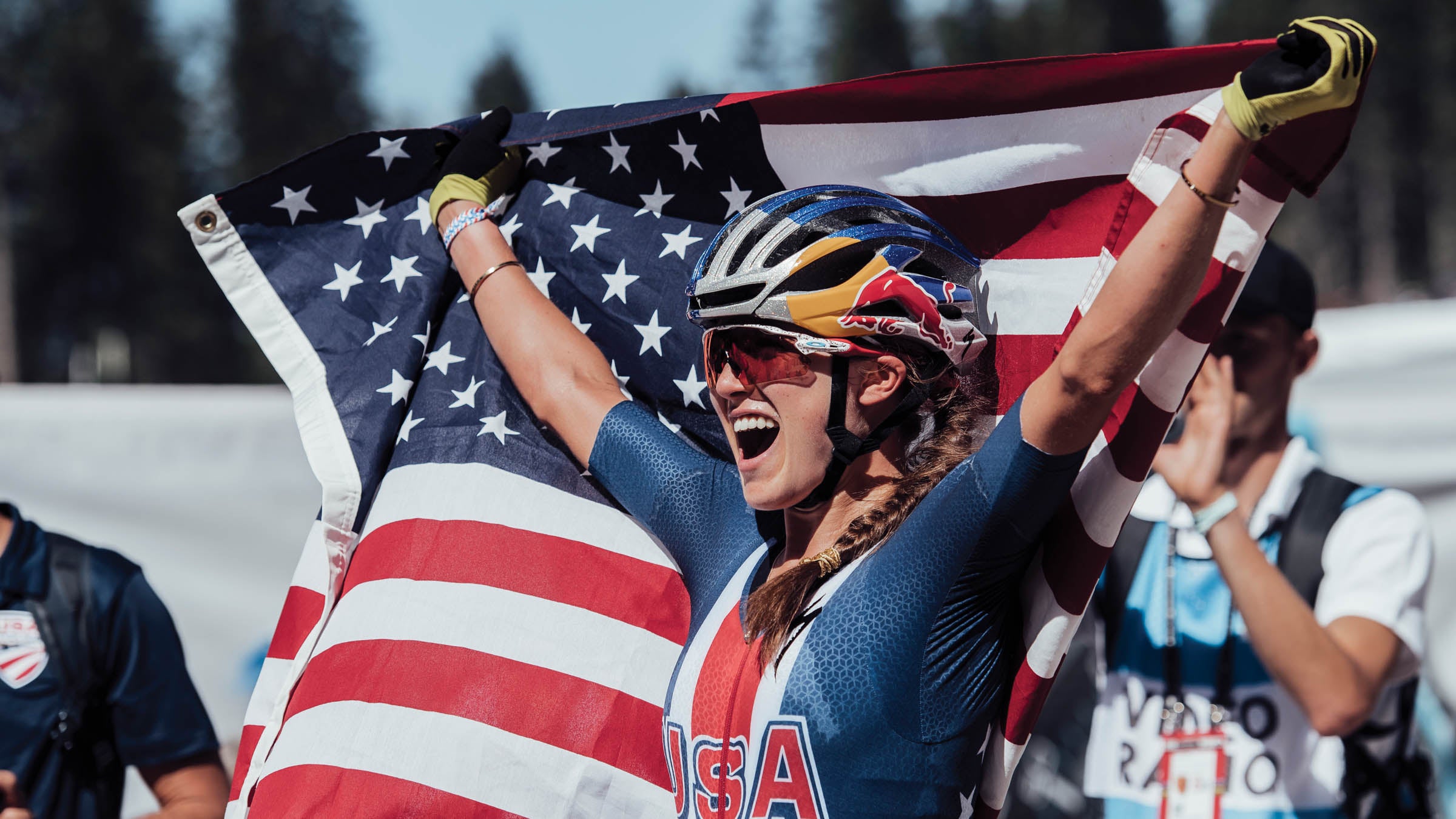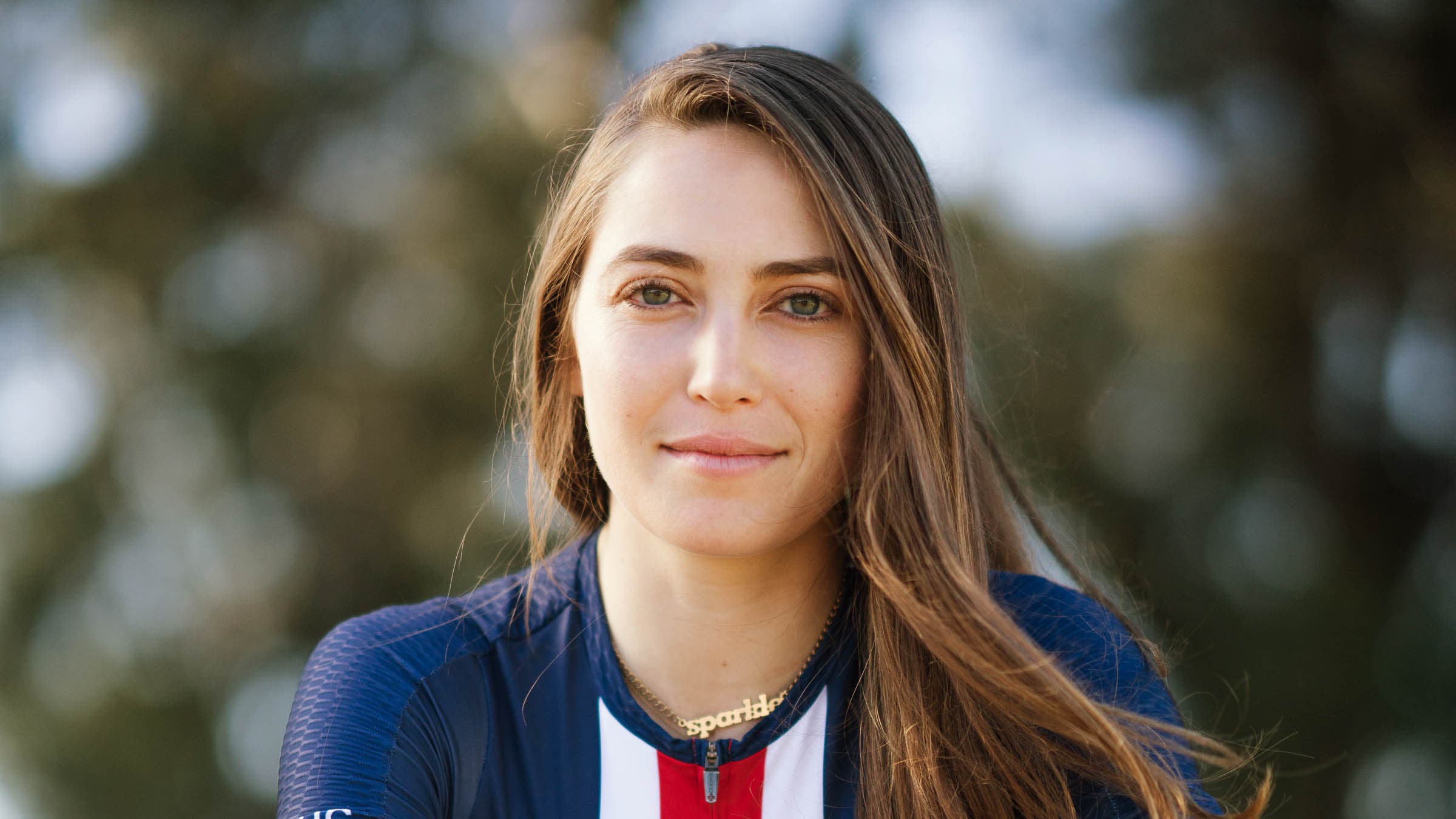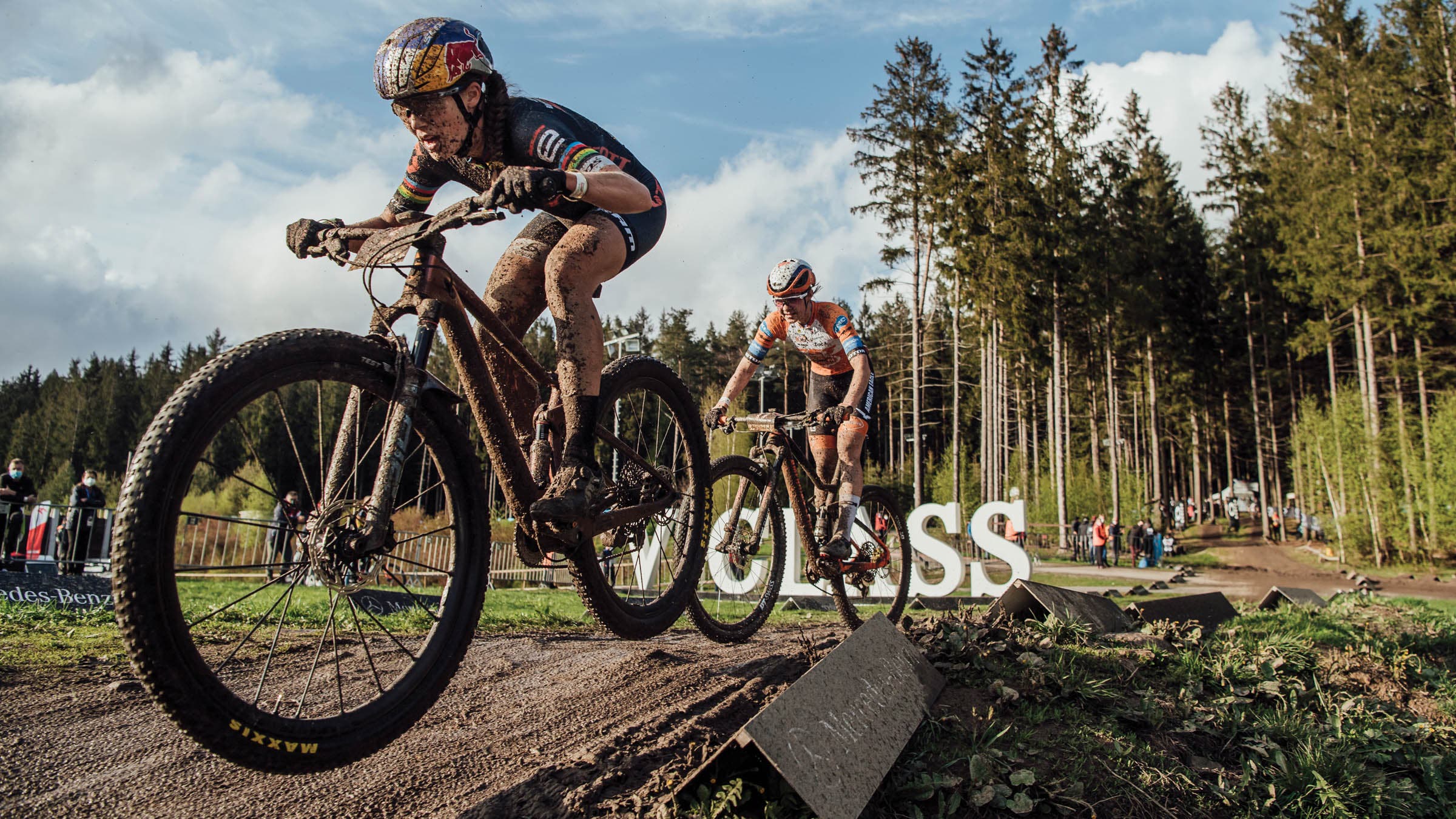Olympic Games: Kate Courtney's Olympic village

(Photo: Courtesy Red Bull Content Pool)
One of the biggest realizations of Kate Courtney’s career as a professional mountain biker was the understanding that it wasn’t all about her.
At the age of 22, Courtney won the mountain bike world championships in Lenzerheide, Switzerland, in 2018. The victory was sweetened by plenty of backstory. It was the Californian’s first season racing as an elite. She’d recently graduated from Stanford. And, this was the first world XC title for an American woman since Alison Dunlap’s win in Colorado, 17 years earlier.
Although it had taken a village to raise Kate-the-mountain-biker, Courtney says that her notion of being a champion was focused entirely too much on herself — until she stood on the podium in Lenzerheide.
Now 25, Courtney recognizes the massive communal effort it’s taken to get her this far, and that when she does well, the ripples are felt throughout that community — from her family to her mechanic to the thousands of young riders that she inspires.
Courtney set her mind on qualifying for the Tokyo Games as soon as she found out she hadn’t qualified for the Rio de Janeiro Olympics in 2016. Since then, she has leaned on her community for support and drawn motivation from the people who she inspires.
Kate Courtney has her own Olympic village.

VELONEWS: Are the Olympics just another race or something else? What do they mean to you?
KATE COURTNEY: No, they’re not just another race. They’re the pinnacle of sport. It’s an opportunity to put cycling alongside every other sport out there which makes it more prestigious and competitive and elevates it for athletes.
For me, it means different things at different points in my life. I grew up watching and admiring Olympians. But it was like watching cartoons, it was so far beyond what I envisioned for my reality. I thought they were like superheroes. The first time I really started to think about trying to make the Olympic team and thought I might be capable of doing so was in 2015/16. It was my second-to-last year as a U23, so I was a bit young to go but I took two quarters off Stanford and tried to make the team. I didn’t make it. It was an interesting moment in my career. A launchpad. It helped me clarify my goals in the sport. In 2016, my goals for the Olympics were around the experience. Getting gear, having my family involved, going to the opening ceremonies — all of these things that surround the experience. I wouldn’t have been a top competitor, I just wanted to go.
VN: After the 2016 games, did Tokyo 2020 become your sole focus?
KC: In cycling, we’re lucky to have many competitions every year, so the overarching goal was on the table, but I was really focused on what was coming next. The next World Cup, next world championships. But — they all did add up to put me in the position to achieve this bigger goal.

VN: Do you remember the moment you set the goal of going to the 2020 Games?
KC: About an hour after I found out I wasn’t going. It was like, ‘I want to go next time, and I don’t want to have to wait!’ It’s an interesting thing — the selection is always challenging. Now I have a bit more maturity and understanding of how it works. In the U.S., they always pick the athlete that’s competing as an elite and can beat other athletes. It’s not the young, ascending athlete.
I sat up at 2 a.m. in Austria to find out I didn’t make the team. I had an overwhelming feeling of ‘OK next time, I don’t want to have any questions when they pick the next team. I want to go to sleep knowing. I want to have already made it and not be waiting for someone to give it to me because I’m pretty good at biking.’
I set a goal of qualifying automatically in 2020 and getting a medal. It was obviously very far from where I was then.
VN: Is there any disappointment that the Games have finally arrived and will be contested without any fans, friends, or family?
KC: I’m going into this Olympics really focused on competing and giving an amazing performance. In the past year, that’s become more and more of a focus, and the fanfare has been stripped down. It’s a unique opportunity to acknowledge that it’s not like any other race, but this year we have the opportunity to prepare for it in a focused environment without any other distractions. I’m looking forward to just racing.
Yes, it’s disappointing not to have family there. They’re a huge part of my support team and it would be really great to share it with them. But in other ways, I have a really great team around me. If there’s anything last year has taught us it’s that we don’t have a clear idea of what’s going to happen next. I’m just focused on the fact that we’re having the Olympics. We can’t take it for granted that a year ago it seemed really unlikely. It’s one of my few opportunities as an athlete, I don’t get that many.
In many ways, there’s silver linings or alternative ways of viewing it. All of this preparation with my family, coaches, et cetera, all there supporting me and I’m going to take all that energy and head to the Olympics. For those eight days, I’m going to be really focused on doing my job. I really enjoy being in that situation. Being able to be focused. So that’s a positive as well.
VN: Speaking of focus, how do you balance your focus on training and racing with the demands of social media and sponsor obligations?
KC: I’ve become better at setting boundaries. Social media doesn’t stress me out that much. For me, there’s a clear separation of personal and professional life. On social media, I do share a lot, but I share in relation to that professional life. I think I do a good job of setting those boundaries around things I want to keep private. If you’re sorting through things, the biggest thing on social media is something you’re already comfortable with. For example, yes, I’ll probably share what I’m doing with this injury. But the timelines of when and what gets shared is all controlled by me.
VN: You’ve also used social media as a platform to promote causes or support the wider cycling community.
KC: Right, it’s not about me, it’s more of an opportunity to use my platform for something good. It’s been a motivating factor throughout. When I share on social media about riding mountain bikes and spending time in nature I think it’s meaningful if it inspires other people to ride their bikes or approach things in a different way that might be beneficial to them. Whether or not I engage at this level, I’m being given an opportunity to develop a platform and I see that as an opportunity to use it positively. Putting out positive messaging about the joy of cycling is totally authentic. I ride every day and enjoy it 90 percent of the time.
VN: Elite mountain bike racing is a sport where women can race at a very high level for years or even decades. Some of the best riders we see are still competing well into their forties. How long do you see yourself dedicating yourself to World Cup or Olympic racing?
KC: I certainly see myself doing this at least into my early thirties. Something that’s very cool right now is that there are a lot more options for women. You can race, retire, have kids. You can race, have kids, keep racing. You can have more flexibility in whatever choices you want to make. I’ve been on the World Cup circuit since I was 17. I can’t make any promises for the future but I suspect that by the time I decide I want to have a family it will be a natural transition point in my career. at will work best for me. I wouldn’t make it as a triathlete; I focus on one thing at a time best! It’s nice that I have the time and flexibility to make those decisions.
Haley [Batten] and I talked about that. It is really exciting to be at the top of the sport at this age and have so much runway ahead of us. To be able to make those decisions. It’s becoming more accepted that different women can make different decisions. You can have huge respect and admiration for someone for what they’re doing and then do something different. It’s accepted that you can make your own decisions.
VN: Talk about your team. You guys seem very close, especially you and your mechanic Brad Copeland.
KC: I call Frischi [Thomas Frischknecht] my Swiss dad. Another special part of what we do is share it with people who aren’t my direct family but who feel like family. If you’re doing it right, that’s when you have the most magical experiences. I would say I have that on the Scott-SRAM team. It really impacts my career. It makes the bad times much more bearable and put in context. ‘Oh the race didn’t go perfectly but at least I’m with these people I care about.’ And the great times are unbelievable. Everyone is so happy for you and with you because they were also a part of it.
VN: When did you know that professional mountain biking was what you were going to do?
KC: It developed gradually. I started racing when I was 14. At the time I had really no concept of what professional mountain bike racing was. It was a bit of a blessing because I just focused on the next step. The world of competitive cycling unfolded year after year. First it was that I could race varsity. Then it was the U.S. Cups, then it was nationals, then a Swiss race, then a junior World Cup, then it was U23, then elite. It unfolded naturally with the levels in the sport. For me, when I saw the next level, it was, ‘OK, I really wanna do that.’ Eventually I had a chance to sign with a pro team during my freshman year of college. By the time I graduated it was the perfect time to transition to racing full-time. I had saved up some money and gotten enough raises to support myself full-time. So it kinda aligned well that the time I was given the opportunity to fully focus and not be in school was the time I was really to rise to that challenge.
It’s interesting when I talk to young kids in NICA or who are racing as juniors who are wondering about the path. I respect their ambition and vision for the future so much. If I’d gotten into the sport now where there’s so much storytelling around it and so much ‘oh, you’re in NICA,’ it would be a totally different scenario. But I’m also like, ‘guys, it’s a long time.’ My best advice is always to focus on the trajectory. In a weird way, if you average out my gains I’ve gotten better by a power perspective every year. It’s been a very long slow build for me. That’s partially because of the way I train and has been my secret weapon in terms of consistency.
VN: What’s been the most surprising thing about your career?
KC: One of the biggest realizations in my career was after winning world champs. It was something I’d personally been focused on for so long. It was my first year as an elite and I needed a lot of support. I was in college, needed my parents for a lot of support, I had this whole team around me. Before that moment, cycling felt a little bit selfish. I tried to do outreach things and be a positive influence in support but it was definitely all about me.
At worlds, having my parents at the finish, coming home, having a party at the Mountain Bike Hall of Fame, seeing the response from the community, people watching the race and being inspired. Kids coming up to me, ‘I’m from Norcal, I wanna be a world champ too.’ It was a really eye-opening experience where I felt that what I was doing actually did matter to people. I was doing it with this team and doing it with joy in a way that I was really proud of. It felt like a gift that I was given and also that I gave to other people. It’s been really motivating. Giving that gift to the people that support me and believe in me has been a huge driving factor.
The next time I did it was in Les Gets, winning in the rainbow jersey in front of my parents again. My dad said that I was the happiest he’s ever seen me. I was happy I won but I was so happy I was able to create an experience for my family that we’ll all remember forever. It was such an exciting accomplishment but it didn’t feel lonely and it didn’t feel like it was just about me.